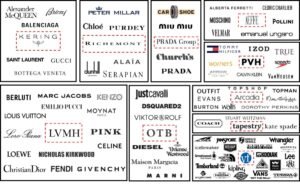Introduction
Luxury brands fashion occupy a unique and influential niche within the global fashion industry. These brands symbolize exclusivity, high craftsmanship, and often a storied history that adds to their mystique and desirability. From the opulent halls of Parisian couture houses to the avant-garde runways of Milan, luxury brands have continually defined and redefined what it means to dress with sophistication and style.
Historical Foundations
The concept of luxury fashion can trace its origins back to the grand courts of European monarchies, where fashion was a means of displaying wealth, status, and power. Designers like Charles Frederick Worth, often considered the father of haute couture, began creating bespoke garments for the European elite in the mid-19th century. Worth’s influence paved the way for the establishment of iconic houses such as Chanel, Dior, and Balenciaga, each contributing to the rich tapestry of fashion history with unique aesthetics and innovative techniques.

Defining Characteristics
luxury brands fashion are distinguished by several key attributes:
- Craftsmanship: At the heart of luxury fashion is an unwavering commitment to craftsmanship. Each piece is meticulously constructed, often by hand, using the finest materials available. This dedication to quality ensures that luxury garments are not only beautiful but also durable and timeless.
- Exclusivity: Scarcity and exclusivity are crucial components of luxury fashion. Limited production runs, exclusive collections, and high price points create a sense of rarity and desirability. Owning a piece from a luxury brand is often seen as a status symbol.
- Heritage and Tradition: Many luxury brands fashion have a long-standing heritage that they celebrate and incorporate into their modern designs. This sense of history and continuity adds depth to the brand’s identity and creates a narrative that resonates with consumers.
- Innovation and Creativity: Despite their deep roots in tradition, luxury brands are also at the forefront of innovation. Designers continually push the boundaries of fashion through avant-garde designs, new techniques, and collaborations with artists and other brands.
Iconic luxury brands fashion

Chanel
Founded by Gabrielle “Coco” Chanel in 1910, Chanel is synonymous with elegance and modernity. Coco Chanel revolutionized women’s fashion by introducing garments that were both comfortable and stylish, such as the iconic little black dress and the Chanel suit. Today, under the creative direction of Virginie Viard, Chanel continues to be a pillar of haute couture and ready-to-wear fashion.
Louis Vuitton
Louis Vuitton, established in 1854, began as a luxury luggage maker. The brand’s monogram canvas, introduced in 1896, has become one of the most recognizable symbols in the world of fashion. Louis Vuitton has successfully expanded into clothing, accessories, and more, blending tradition with modernity. Creative directors like Marc Jacobs and Virgil Abloh have brought fresh perspectives to the brand, ensuring its relevance across generations.
Gucci
Gucci, founded in Florence in 1921 by Guccio Gucci, started as a small leather goods and luggage company. Known for its distinctive interlocking G logo and the green-red-green stripe, Gucci has evolved into a powerhouse of luxury fashion. Under the creative vision of Alessandro Michele, Gucci has embraced a maximalist aesthetic, celebrating boldness, eclecticism, and individuality.
Hermès
Established in 1837 as a harness workshop, Hermès is renowned for its exceptional craftsmanship and timeless designs. The brand’s Birkin and Kelly bags are legendary, often accompanied by long waiting lists. Hermès continues to set the standard for luxury, with a focus on quality materials and artisanal techniques.
The Role of Marketing and Branding
Luxury brands fashion employ sophisticated marketing strategies to maintain their exclusive image and appeal. These strategies include:
- Storytelling: Luxury brands craft compelling narratives around their heritage, craftsmanship, and the lifestyle they represent. These stories are communicated through advertising campaigns, fashion shows, and digital content.
- Celebrity Endorsements: Collaborations with celebrities and influencers enhance a brand’s visibility and desirability. When high-profile individuals are seen wearing a luxury brand, it creates a powerful association with prestige and style.
- Experiential Retail: Luxury brands invest in creating unique and immersive retail experiences. Flagship stores, often located in prestigious locations, are designed to reflect the brand’s identity and provide a personalized shopping experience.
- Digital Presence: In the digital age, luxury brands have embraced online platforms to reach a global audience. Social media, e-commerce, and virtual fashion shows have become integral to their marketing strategies, allowing them to engage with consumers in innovative ways.
Sustainability and Social Responsibility
In recent years,luxury brands fashion have faced increasing scrutiny regarding their environmental and social impact. As a result, many brands are adopting more sustainable practices and emphasizing corporate social responsibility. This includes sourcing eco-friendly materials, reducing waste, and ensuring fair labor practices.
Brands like Stella McCartney have been pioneers in sustainable luxury fashion, advocating for cruelty-free and environmentally conscious design. Other brands are following suit, recognizing that modern consumers value sustainability and ethical practices alongside luxury and craftsmanship.
Conclusion
Luxury brands fashion occupy a unique position in the fashion industry, blending history, craftsmanship, and innovation to create products that are both timeless and cutting-edge. From the ateliers of Paris to the digital runways of the 21st century, these brands continue to shape the way we perceive and experience fashion. As they navigate the challenges and opportunities of the modern world,luxury brands fashion remain symbols of aspiration, elegance, and enduring style.



